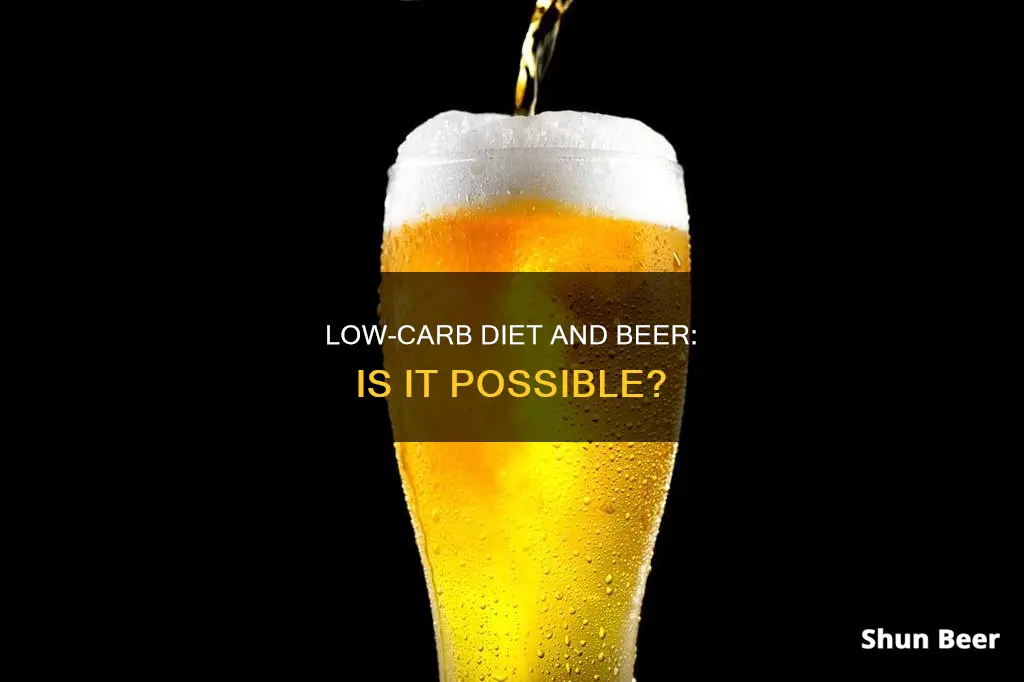
If you're on a low-carb diet, you might be wondering if you can still enjoy a beer. The short answer is yes, but there are some things to keep in mind. Beer is one of the highest-carb alcohol options, with starch being one of its primary ingredients. A typical beer contains 3-12 grams of carbs per 12 ounces, and light beers have slightly fewer. If you're on a keto diet, you'll want to limit your carb intake, and there are some low-carb beers on the market that might work for you. Even on a low-carb diet, you can still enjoy alcoholic drinks in moderation, as long as you count the carbohydrates into your daily carb count. Pure forms of liquor like rum, whiskey, gin, and vodka are all carb-free, and wine is also relatively low in carbs.
Can you drink beer on a low-carb diet?
| Characteristics | Values |
|---|---|
| Carbohydrates | Beer typically has a high carb content, with 3-12 grams of carbs per 12-ounce (355-ml) serving. |
| Calories | Alcohol is the second most calorie-dense nutrient, packing 7 calories per gram. |
| Weight Loss | Alcohol can slow down weight loss by providing empty calories and stimulating appetite. |
| Low-Carb Options | Light beer, wine, and pure liquor (rum, whiskey, gin, and vodka) are low-carb options. |
| Effects of Alcohol | On a low-carb diet, you might feel stronger effects from alcohol, including intoxication and hangovers. |
What You'll Learn

Low-carb beers are made with enzymes that break down the carbohydrates into alcohol
Low-carb beers are typically made with enzymes that break down carbohydrates into alcohol. This process is known as fermentation, and it's crucial for creating low-carb beers that retain the taste and flavour that drinkers know and love.
During the "mashing" stage of brewing, enzymes break down much of the carbohydrates derived from malted barley into simpler sugars. Then, during the fermentation stage, brewing yeast converts these sugars into alcohol and carbon dioxide.
To make a low-carb beer, brewers extend the mashing and fermentation stages to allow for a more complete breakdown of carbohydrates. This results in a lower carbohydrate content in the final beer. For example, a typical beer might have around 2.5g of carbohydrates per 100ml, while a low-carb beer might have only 0.5g per 100ml.
Some brewers also use specific enzymes, such as Neoamylo L, Promozyme 400 L, and Amylo 400G, to reduce the carb content of their low-carb beers. Additionally, ingredients like flaked corn or rice syrup can be used in the mash to create a more complete fermentation and reduce residual carbs.
It's important to note that low-carb beers might have a slightly higher alcohol content than their regular counterparts, as more carbohydrates are being converted into alcohol. However, this difference in alcohol content is usually minimal.
When choosing a low-carb beer, it's essential to read the nutritional information on the packaging or look it up online. A good benchmark for people watching their carb intake is to aim for beers with 5g of carbohydrates or fewer per serving.
Huntington Beach Beer Rules: Drinking Allowed or Not?
You may want to see also

Spirits contain fewer carbs than beer
When it comes to alcoholic drinks, spirits contain fewer carbohydrates than beer. Spirits such as whiskey, brandy, cognac, vodka, gin, and tequila contain zero carbs and are suitable for a keto diet. On the other hand, beer is typically high in carbs, with an average of 13 grams of carbs per 12-ounce serving. However, there are some low-carb beer options available, typically containing around 5 grams of carbs or less per serving.
The Impact of Alcohol on Weight Loss
Alcoholic beverages, regardless of type, contain 7 calories per gram, and excessive consumption can contribute to weight gain. Additionally, alcohol can slow down weight loss by providing "empty calories" and stimulating appetite, leading to increased food intake. Therefore, moderation is key when consuming alcohol, especially when following a low-carb or keto diet.
Pure Spirits vs Beer
Pure spirits, such as whiskey and vodka, contain zero carbs and are a better choice for those watching their carbohydrate intake. However, when mixers are added to spirits, the carb count can increase significantly. For example, a cup of orange juice contains 27.4 grams of carbs, and tonic water has 32.2 grams of carbs in the same size container as a regular beer.
Beer, on the other hand, is typically high in carbs. A standard 12-ounce serving of 5% ABV beer usually has around 150 calories and 13 grams of carbs. However, there are low-carb and light beer options available, which typically have fewer calories and a lower ABV. These beers are often brewed with distinct enzymes that break down carbohydrates during the fermentation process, resulting in a lower carb content.
Examples of Low-Carb Spirits and Beers
Some examples of low-carb spirits include whiskey, brandy, cognac, vodka, gin, and tequila. These spirits can be enjoyed neat or with low-carb mixers like soda water and lime.
For beer drinkers, there are also several low-carb options available. Some popular choices include:
- Budweiser Select 55: 55 calories, 1.9 grams of carbs, 2.4% ABV
- Corona Premier: 90 calories, 2.6 grams of carbs, 4.0% ABV
- Miller Lite: 3.2 grams of carbs, 4.2% ABV
- Beck's Premier Light: 64 calories, 3.9 grams of carbs, 2.3% ABV
- Michelob Ultra Pure Gold: 85 calories, 2.5 grams of carbs, 3.8% ABV
- Amstel Light: 95 calories, 5 grams of carbs, 3.5% ABV
Is Drinking Old Beer Safe?
You may want to see also

Wine is much lower in carbs than beer
Wine and beer are two of the most popular alcoholic beverages, with distinct differences in flavour, ingredients, and nutritional value. While both drinks have similar calorie counts, wine is much lower in carbohydrates than beer.
Beer is made using grains and yeast, and the calorie content varies depending on the type. Most light beers have between 60 and 120 calories due to their lower alcohol content and ingredient density. Dark beers, which are heavier and tend to have more carbohydrates, contain between 100 and 300 calories. The USDA National Nutrient Database estimates that regular beer contains about 12.6 grams of carbohydrates per can. Therefore, if you're looking to cut down on carbs, beer may not be the best choice. However, opting for a low-carb variety can be a better option.
Wine, on the other hand, is made with fermented grapes and typically has a relatively low sugar content. It contains between 120 and 210 calories per six-ounce glass, with the exact nutritional information varying based on alcohol content and ingredient density. Red wine is made by including grape skins during fermentation, while white wine does not, resulting in its lighter colour.
When comparing the two drinks, wine is significantly lower in carbohydrates. A standard serving size of five fluid ounces of wine contains around 3 to 5 grams of carbohydrates, depending on the variety. In contrast, a 12-fluid-ounce bottle of beer typically contains 5 to 14 grams of carbohydrates. Sweeter wines will have more added sugars and a higher carb count, so dry wines are a better choice for those watching their carb intake.
Additionally, the type of alcohol you choose depends on your individual preferences, goals, and consumption habits. While alcohol is not a healthy choice, it can be part of a nourishing diet and lifestyle if consumed in moderation, with a focus on minimising carbohydrates, calories, and sugar content.
Mixing Beer and Wine: What Happens When You Do It?
You may want to see also

Pure spirits like whiskey and vodka contain zero carbs
When it comes to alcohol, it is important to remember that it does contain calories, and these calories are used by the body before it burns fat. Additionally, alcohol can stimulate appetite and decrease inhibitions, leading to increased food intake. Therefore, it is recommended to consume alcohol in moderation as part of a keto or low-carb lifestyle.
While beer is typically high in carbs, with an average of 13-17 grams of carbs per serving, there are some low-carb options available. These include light beers, such as Budweiser Select 55, which has only 2 grams of carbs per serving, or Corona Premier, which has 2.6 grams of carbs. However, beer should still be consumed sparingly due to its high-calorie content.
Wines can also vary in their carb content, with dry wines, such as brut champagne, Sauvignon Blanc, and Cabernet Sauvignon, being lower in carbs than sweeter varieties like Moscato and Riesling. A typical glass of dry wine contains around 1-2 grams of carbs, while dessert wines can have up to 20 grams of carbs per glass. Therefore, when choosing a wine, it is best to stick to dry varieties and those with a higher alcohol content, as they tend to have fewer carbs.
Beer and Prediabetes: What's the Verdict?
You may want to see also

Beer is made from grains, which provide a lot of rapidly digestible carbs
Beer is typically made from four key ingredients: grains, hops, yeast, and water. While the other ingredients are important, it is the grains that provide the carbohydrates. Starch is one of the primary ingredients in beer, and beer generally contains 3–12 grams of carbs per 12-ounce (355-ml) serving.
The exact amount of carbs in beer depends on various factors, such as whether it is a light or regular variety, and the brand. For example, a typical beer has 13 grams of carbs per 12 ounces (355 ml), but this can range from 1.9 grams for Select 55 to 14 grams for Corona Extra.
The high carb content in beer is due to the grains used in the brewing process, which provide a lot of rapidly digestible carbs. This has led to beer being referred to as "liquid bread". As a result, beer is generally not considered to be a good choice for people trying to lose weight or improve diabetes control.
However, there are some low-carb beer options available, which typically have fewer than 5 grams of carbs per serving. These include Budweiser Select 55, Corona Premier, Miller Lite, and Beck's Premier Light, among others.
Beer and Medication: Safe or Not?
You may want to see also
Frequently asked questions
Yes, you can drink alcohol on a low-carb diet, but it's best to stick to low-carb options like wine, light beer, or pure forms of liquor such as whiskey, gin, and vodka.
Beer typically has a high carb content due to starch being one of its primary ingredients. A 12-ounce serving of beer usually contains between 3 and 12 grams of carbs, depending on whether it's a light or regular variety.
Low-carb beers generally have less than 1 gram of carbs per 100 milliliters. Some popular options include Corona Premier, Budweiser Select 55, and Beck's Premier Light.
Yes, you can drink beer on a keto diet as long as you choose low-carb options. Wine, light beer, and pure alcohol are all low in carbs and can be enjoyed in moderation.
Alcohol contains empty calories, meaning it has a lot of calories but little nutritional value. Excessive alcohol consumption can also slow down fat burning and contribute to weight gain over time. Therefore, it's important to drink in moderation, regardless of your diet.







